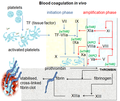Factor X
Overview[edit]
Factor X, also known as Stuart-Prower factor, is an essential enzyme in the coagulation cascade, which is crucial for hemostasis. It is a serine protease that plays a pivotal role in the conversion of prothrombin to thrombin, a key step in the formation of a blood clot.
Structure[edit]
Factor X is synthesized in the liver and requires vitamin K for its activation. It circulates in the blood as an inactive zymogen. Upon activation, it becomes Factor Xa, which is the active form of the enzyme.
Activation[edit]
Factor X can be activated via two pathways:
- The intrinsic pathway, which is initiated by damage to the endothelium and involves several other clotting factors.
- The extrinsic pathway, which is triggered by external trauma that causes blood to escape from the vascular system.
Both pathways converge at the activation of Factor X, leading to the common pathway of coagulation.
Function[edit]
Once activated to Factor Xa, it forms a complex with Factor V, calcium ions, and phospholipids on the surface of platelets. This complex, known as the prothrombinase complex, catalyzes the conversion of prothrombin to thrombin. Thrombin then converts fibrinogen to fibrin, which forms the mesh that stabilizes the blood clot.
Clinical Significance[edit]
Deficiency or dysfunction of Factor X can lead to bleeding disorders. Conversely, excessive activity can result in thrombosis. Factor X inhibitors, such as rivaroxaban and apixaban, are used as anticoagulants to prevent and treat thromboembolic disorders.
In Vivo Coagulation[edit]
In vivo, the regulation of Factor X activation is tightly controlled to maintain a balance between bleeding and clotting. The endothelial cells and antithrombin play roles in modulating its activity.
Related Pages[edit]
-
Factor X
Ad. Transform your life with W8MD's Budget GLP-1 injections from $49.99


W8MD offers a medical weight loss program to lose weight in Philadelphia. Our physician-supervised medical weight loss provides:
- Weight loss injections in NYC (generic and brand names):
- Zepbound / Mounjaro, Wegovy / Ozempic, Saxenda
- Most insurances accepted or discounted self-pay rates. We will obtain insurance prior authorizations if needed.
- Generic GLP1 weight loss injections from $49.99 for the starting dose of Semaglutide and $65.00 for Tirzepatide.
- Also offer prescription weight loss medications including Phentermine, Qsymia, Diethylpropion, Contrave etc.
NYC weight loss doctor appointmentsNYC weight loss doctor appointments
Start your NYC weight loss journey today at our NYC medical weight loss and Philadelphia medical weight loss clinics.
- Call 718-946-5500 to lose weight in NYC or for medical weight loss in Philadelphia 215-676-2334.
- Tags:NYC medical weight loss, Philadelphia lose weight Zepbound NYC, Budget GLP1 weight loss injections, Wegovy Philadelphia, Wegovy NYC, Philadelphia medical weight loss, Brookly weight loss and Wegovy NYC
|
WikiMD's Wellness Encyclopedia |
| Let Food Be Thy Medicine Medicine Thy Food - Hippocrates |
Medical Disclaimer: WikiMD is not a substitute for professional medical advice. The information on WikiMD is provided as an information resource only, may be incorrect, outdated or misleading, and is not to be used or relied on for any diagnostic or treatment purposes. Please consult your health care provider before making any healthcare decisions or for guidance about a specific medical condition. WikiMD expressly disclaims responsibility, and shall have no liability, for any damages, loss, injury, or liability whatsoever suffered as a result of your reliance on the information contained in this site. By visiting this site you agree to the foregoing terms and conditions, which may from time to time be changed or supplemented by WikiMD. If you do not agree to the foregoing terms and conditions, you should not enter or use this site. See full disclaimer.
Credits:Most images are courtesy of Wikimedia commons, and templates, categories Wikipedia, licensed under CC BY SA or similar.
Translate this page: - East Asian
中文,
日本,
한국어,
South Asian
हिन्दी,
தமிழ்,
తెలుగు,
Urdu,
ಕನ್ನಡ,
Southeast Asian
Indonesian,
Vietnamese,
Thai,
မြန်မာဘာသာ,
বাংলা
European
español,
Deutsch,
français,
Greek,
português do Brasil,
polski,
română,
русский,
Nederlands,
norsk,
svenska,
suomi,
Italian
Middle Eastern & African
عربى,
Turkish,
Persian,
Hebrew,
Afrikaans,
isiZulu,
Kiswahili,
Other
Bulgarian,
Hungarian,
Czech,
Swedish,
മലയാളം,
मराठी,
ਪੰਜਾਬੀ,
ગુજરાતી,
Portuguese,
Ukrainian
